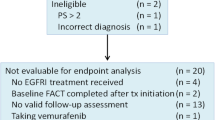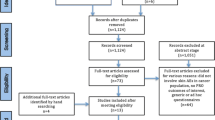Abstract
Purpose
Dermatologic toxicities from epidermal growth factor receptor inhibitors (EGFRIs) are common, disrupt health-related quality of life (HRQL), and lead to dose reduction or discontinuation of potentially life-saving cancer therapy. The Functional Assessment of Cancer Therapy (FACT)-EGFRI was developed to measure HRQL among patients receiving EGFRIs.
Methods
The FACT-EGFRI was developed through the triangulation approach using the established functional assessment of chronic illness therapy method of patient questionnaire construction. This included literature review, qualitative data collection and analysis, and quantitative survey data collection on candidate items to identify the most important items related to EGFRI-induced dermatologic toxicities according to patients receiving EGFRIs and expert clinicians.
Results
Twelve expert clinicians and 20 patients were interviewed for the initial questionnaire development. Dermatologic symptoms associated with epidermal growth factor receptor inhibitors endorsed as high priority by both patients and oncologist experts were selected. The final version includes 18 items which assess the physical, emotional, social, and functional impact that skin, nail, and hair toxicities have on patients’ HRQL.
Conclusions
The FACT-EGFRI-18 measures the severity of patient-reported EGFRI-induced dermatologic toxicities and effects on HRQL and was developed using qualitative data from patients and expert clinicians. Further validation is underway. The FACT-EGFRI-18 may be useful for clinicians and researchers to quantify dermatologic toxicities from the patient perspective in standard clinical care, evaluate the effectiveness of interventions to prevent or reduce dermatologic toxicities, and to guide treatment decision making.
Similar content being viewed by others
References
Cella DF (1994) Quality of life: concepts and definition. J Pain Symptom Manag 9(3):186–192
Wagner LI, Cella D (2012) Psychosocial issues in oncology: clinical management of psychosocial distress, health-related quality of life and special considerations in dermatologic oncology. In: Lacouture M (ed) Dermatologic principles and practice in oncology. Wiley, New Jersey
Mendelsohn J, Baselga J (2006) Epidermal growth factor receptor targeting in cancer. Semin Oncol 33(4):369–385
Lacouture ME (2006) Mechanisms of cutaneous toxicities to EGFR inhibitors. Nat Rev Cancer 6(10):803–812
Wagner LI, Lacouture ME (2007) Dermatologic toxicities associated with EGFR inhibitors: the clinical psychologist's perspective. Impact on health-related quality of life and implications for clinical management of psychological sequelae. Oncol (Williston Park) 21(11 Suppl 5):34–36
Joshi SS, Ortiz JS, Witherspoon J, Rademaker A, West DP, Anderson R, Rosenbaum S, Lacouture ME (2010) Effects of EGFR inhibitor-induced dermatologic toxicities on quality of life. Cancer 116:3916–3923
Shepherd FA, Rodrigues Pereira J et al (2005) Erlotinib in previously treated non-small-cell lung cancer. N Engl J Med 353(2):123–132
Witherspoon JN, W. L., Rademaker A, West DP, Rosenbaum SE, Lacouture ME (2008). Correlation of patient characteristics and NCI-Common Terminology Criteria for Adverse Events (CTCAE) v 3.0 grading with dermatology-related quality of life (QoL) in patients with EGFR inhibitor induced rash. In: ASCO Annual Meeting, Scientific Program. Abstract 9559
Lynch TJ Jr, Kim ES et al (2007) Epidermal growth factor receptor inhibitor-associated cutaneous toxicities: an evolving paradigm in clinical management. Oncologist 12(5):610–621
Van Cutsem E, Peeters M et al (2007) Open-label phase III trial of panitumumab plus best supportive care compared with best supportive care alone in patients with chemotherapy-refractory metastatic colorectal cancer. J Clin Oncol 25(13):1658–1664
Trotti A, Colevas AD et al (2003) CTCAE v3.0: development of a comprehensive grading system for the adverse effects of cancer treatment. Semin Radiat Oncol 13(3):176–181
Edgerly M, Fojo T (2008) Is there room for improvement in adverse event reporting in the era of targeted therapies? J Natl Cancer Inst 100(4):240–242
Chren MM, Lasek RJ et al (1996) Skindex, a quality-of-life measure for patients with skin disease: reliability, validity, and responsiveness. J Investig Dermatol 107(5):707–713
Finlay AY, Khan GK (1994) Dermatology life quality index (DLQI): a simple practical measure for routine clinical use. Clin Exp Dermatol 19:210–216
Cella D, Nowinski CJ (2002) Measuring quality of life in chronic illness: the functional assessment of chronic illness therapy measurement system. Arch Phys Med Rehabil 83(12 Suppl 2):S10–S17
Cella DF, Tulsky DS, Gray G et al (1993) The functional assessment of cancer therapy scale: development and validation of the general measure. J Clin Oncol 11:570–579
Webster K, Cella D, Yost K (2003) The functional assessment of chronic illness therapy (FACIT) measurement system: properties, applications, and interpretation. Health Qual Life Outcome 1:79
Trotti A, Colevas AD et al (2007) Patient-reported outcomes and the evolution of adverse event reporting in oncology. J Clin Oncol 25(32):5121–5127
Lacouture ME, Basti S et al (2006) The SERIES clinic: an interdisciplinary approach to the management of toxicities of EGFR inhibitors. J Support Oncol 4(5):236–238
Mitchell E, L. M., Shearer H, Iannotti N, Piperdi B, Pillai M, et al. (2008). A phase II, open-label trial of skin toxicity evaluation (STEPP) in metastatic colorectal cancer patients receiving panitumumab + FOLFIRI or irinotecan-only chemotherapy as 2nd-line treatment. In:10th World Congress on Gastrointestinal Cancer. O-021
Boone SL, Rademaker A et al (2007) Impact and management of skin toxicity associated with anti-epidermal growth factor receptor therapy: survey results. Oncology 72(3–4):152–159
Lacouture ME, Mitchell EP, Piperdi B, Pillai MV, Sheare H, Iannotti N, Xu F, Yassine M (2010) Skin toxicity evaluation protocol with panitumumab (STEPP), a phase II, open-label, randomized trial evaluating the impact of a pre-emptive skin treatment regimen on skin toxicities and quality of life in patients with metastatic colorectal cancer. J Clin Oncol 10(28):1351–1357
Acknowledgments
This study is supported by a Zell Scholarship from the Robert H. Lurie Comprehensive Cancer Center, Northwestern University (M.E.L.) and a Career Development Award from the Dermatology Foundation.
Disclosures
Dr. Mario Lacouture has declared a potential conflict of interest in serving in a consulting role for Amgen, OSI Pharmaceuticals, Bristol-Myers Squibb, ImClone, Genentech, Roche, Astra Zeneca, and Lilly. All remaining authors have declared no conflicts of interest.
Author information
Authors and Affiliations
Corresponding author
Appendix 1. Functional Assessment of Cancer Therapy-EGFRI-18
Appendix 1. Functional Assessment of Cancer Therapy-EGFRI-18

Rights and permissions
About this article
Cite this article
Wagner, L.I., Berg, S.R., Gandhi, M. et al. The development of a Functional Assessment of Cancer Therapy (FACT) questionnaire to assess dermatologic symptoms associated with epidermal growth factor receptor inhibitors (FACT-EGFRI-18). Support Care Cancer 21, 1033–1041 (2013). https://doi.org/10.1007/s00520-012-1623-4
Received:
Accepted:
Published:
Issue Date:
DOI: https://doi.org/10.1007/s00520-012-1623-4




